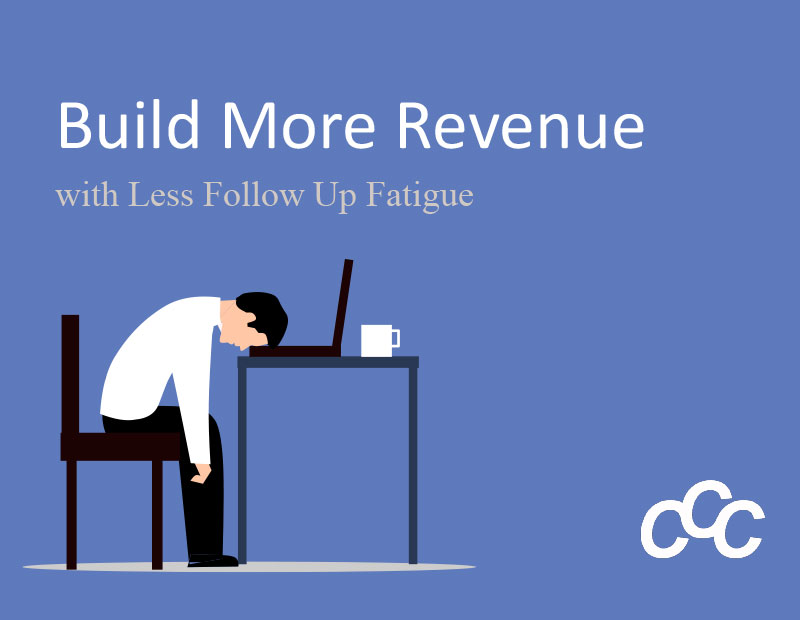If you own a business in the trades such as plumbing, HVAC, and roofing among others, you need a CRM. This is a bold statement, but it is a true statement. Businesses in the trades need to attract and nurture customers. Attracting and nurturing customers is time-consuming when it is done manually. This leads to follow-up fatigue and missed opportunities. Let’s look at a fictional example:
Robin’s Roofing is a locally owned small business with 2 salespeople. The salespeople make cold calls and follow up with leads from the website or voicemails. Each salesperson has their own way of doing things. The first salesperson jots down notes for estimates and follow-up questions. This salesperson often forgets its note pad at the office so she tries to remember her previous notes or she starts a new notepad of contact notes. The 2nd salesperson uses a spreadsheet but forgets to update the information. In both cases, opportunities have been lost because the prospect was frustrated with the number of follow-up calls to either get repeat information or correct the wrong information.
One more example…
Harry’s HVAC Services has been in business for many years. Harry is getting a bad reputation for quality service and customer service. His office team does not have a central hub for work orders. Notes are passed around in the office with a verbal assumption that someone else will “take care of it.” Because of this, equipment is not getting ordered in time for an installation, technicians are double-booked for service requests, and invoices are not being sent out in a timely manner after a request is finished. As a result, Harry is losing business and profits.
There is a common denominator with both examples. Robin’s Roofing and Harry’s HVAC are managing everything manually and nothing is centralized. They are not using a CRM to manage their businesses.
Keeping Robin and Harry in mind, let’s look at three reasons why companies in the trades need a CRM. If Robin and Harry used a CRM to manage their business, we are confident they would not lose opportunities and their reputation would improve.
Nurture customers with dynamic lists
No one likes to get an email that is not relevant to them. Those types of emails are often labeled as spam, and you do not want your emails going to the spam folder. As a business owner in the trades, a CRM gives you the ability to create dynamic lists based on specific criteria. For example, you may want to create a dynamic list that includes any customer that had an install within 60-90 days. You can send an email or a text about maintenance or warranty information to this list. Since it is dynamic, you do not have to worry about moving customers from list to list. If they meet the criteria, they will be added to the list. If not, the CRM removes them from the list. With a CRM, you can correspond with customers based on their stage in your Customer Journey.
Automate your sales and business processes
Every business has several steps in its sales and business processes. For the trades, it can be more than other businesses. From the initial contact (website or phone) to nurturing and closing the sale to fulfilling the service order to maintaining the customer relationship after the service is completed. This involves a great deal of follow-up. It is virtually impossible to stay on top of every step for every prospect and customer.
A CRM takes the weight of follow-up off your shoulders with automation. Automation is a method that automates repetitive but necessary tasks. For example, a customer fills out a contact form on your website. A necessary task is responding with a thank you for contacting us by email. This email can be automated with a link to schedule a call to go over their request. This is a simple example, so here are other ideas for automation:
- Make a job active when a signed proposal is returned
- Send an email to the customer of what to expect before work begins
- Send a review request when the job is complete
- Send an invoice when the job is marked complete in the CRM
- Send warranty information 7 days after the job completion
- Send a maintenance reminder 6 months after the last service
With a CRM, you minimize Follow Up Fatigue and your customers get the communication and service that they deserve.
Communicating with your team
How many times have frustrations flared in the office or in the field due to miscommunication? If a request or task is verbally assigned but is not recorded, there is a higher risk of it getting overlooked and/or forgotten. In the trades, this can hurt a business’s reputation and financial outcome.
A CRM centralizes internal communication. As customers and jobs are added to the CRM, you can do the following:
- Look at your technicians’ workload, and assign projects accordingly
- Schedule each process of a project from ordering materials and the installation to sending the final invoice to the billing department
- Add notes about the customer and project in the customer’s record so everyone is on the same page.
- Attach documents such as permits and the signed contract to the customer’s record
Centralizing communication with a CRM reduces double-booking and miscommunication. Everyone in the business knows what is happening each day and each week.
Conclusion
If you are a business owner in one of the trades and you are not using a CRM, where do you start? There are many CRMs that you can use and some are very pricey. You can start by scheduling a free demo with us. We will show you how the robust and cost-effective X2CRM can help you manage your business using dynamic lists and automation as well as other features such as our service ticket module. Contact us today.[/vc_column_text][/vc_column][/vc_row][vc_row][vc_column][vc_custom_heading text=”More CRM Topics” font_container=”tag:h2|text_align:center” use_theme_fonts=”yes”][vc_empty_space][vc_basic_grid post_type=”post” max_items=”2″ element_width=”6″ orderby=”rand” grid_id=”vc_gid:1644325093236-668b45fa-bc6d-4″ taxonomies=”25, 41″][/vc_column][/vc_row]





